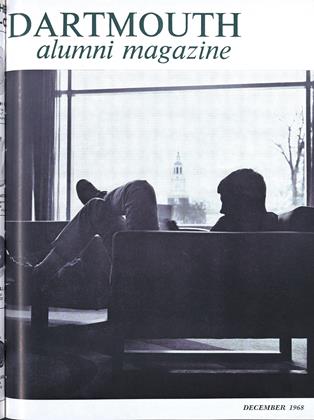WE try to treat people more like human beings than patients; as a result, patients tend to respond like human beings and to get well sooner." In this comment, Dr. Robert J. Weiss, chairman of the Department of Psychiatry at Dartmouth Medical School and chief psychiatrist at Mary Hitchcock Memorial Hospital, sought to express in simplified terms a basic philosophy underlying the operation of the Dartmouth-Hitchcock Mental Health Center.
The dedication ceremony for the new center was held October 27 and attended by more than 300 physicians and psychiatrists, public health officers, and government officials. The principal speaker for the occasion, Dr. Stanley F. Yolles, director of the National Institute of Mental Health, characterized the work of the center as "pioneering in the area of comprehensive mental health care for all northern New England."
The $1.5-million facility, which opened for its first patients in July, is already serving as the physical staging area for a three-way attack on some of the stubborn problems before psychiatric medicine. The center is testing new ways to improve hospital care and rehabilitation of mentally ill persons; to extend psychiatric assistance through modern television technology to people who may be remote from, Or hesitant about seeking, trained psychiatric help; and to provide continuing education for physicians in dealing with patients whose health problems may have emotional roots.
Dr. Weiss is director and conceptual architect of the new center. It contains accommodations for 28 resident patients, plus an extensive out-patient service, all conceived to create a home-like atmosphere. In this spirit, neither doctors nor nurses wear uniforms. The rooms are colorful and are furnished for warmth and cheer.
To avoid the shut-in sense, the center was designed to impart a feeling of openness and space. For instance, the living room at the center of each unit of patient rooms is two stories high with windows reaching almost to the ceiling. Outside is an attractively landscaped patio on which patients walk, play games, or just sun themselves. The facilities include a laundry and complete kitchen, to give patients a chance to do familiar, useful things and feel some sense of independence. The in-patient section for adolescents has record players available so that they can create the atmosphere of music they like without disturbing older patients.
Although Dr. Weiss emphasizes that no definite conclusions can be drawn from only three months' experience, he acknowledges that patients have responded well to psychiatric treatment in the home-like environment of the center. On the average, they have been ready to return to their homes and function in social situations in remarkably short time. The percentage of people needing readmission has been gratifyingly low.
To make its services more widely available and to help general practitioners in surrounding communities deal more confidently with patients with emotional illness, the center is pioneering in longdistance psychiatric counselling via closed-circuit television. Under the program, psychiatric consultation by television is available 24 hours a day, seven days a week, to individual patients through arrangements with the family or local hospital doctors, who participate in the interviews.
The new Dartmouth-Hitchcock Mental Health Center was completed this fall.
 View Full Issue
View Full Issue
More From This Issue
-
 Feature
Feature"Our trusty and well-beloved John Wentworth Esq., Governor"
December 1968 By Susan Liddicoat -
 Feature
FeatureOf Peaceful Men and Violent Ideas
December 1968 By DEAN THADDEUS SEYMOUR -
 Feature
FeaturePolitical Year 1968: A Reprise
December 1968 By EDWARD W. GUDE '59, INSTRUCTOR IN GOVERNMENT -
 Class Notes
Class Notes1934
December 1968 By STANLEY H. SILVERMAN, EDWARD S. BROWN JR. -
 Article
ArticleThe Faculty
December 1968 By WILLIAM R. MEYER -
 Class Notes
Class Notes1935
December 1968 By RICHARD K. MONTGOMERY, C. HALL COLTON
Article
-
 Article
ArticleMEDICAL SCHOOL ASSOCIATION
January 1924 -
 Article
ArticleTrustees Meet
June 1936 -
 Article
ArticleKey to Abbreviations of Branches of Service
October 1942 -
 Article
ArticleDCAC "Football News"
MAY 1957 -
 Article
ArticleOTHER WINTER SPORTS
APRIL 1964 By DAVE ORR '57 -
 Article
ArticleFRANK WARREN GARRAN
November 1945 By WILLIAM P. KIMBALL '28

